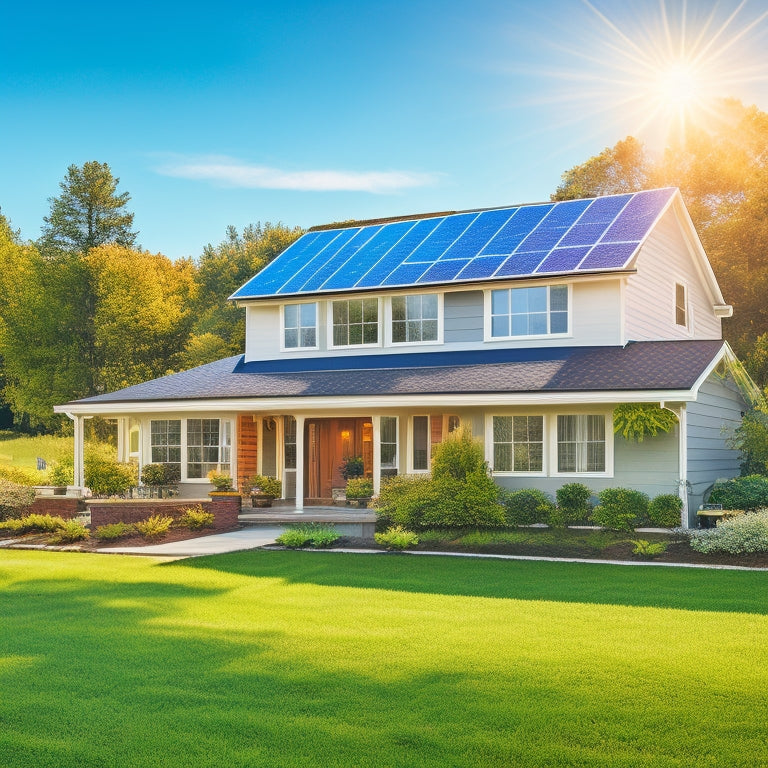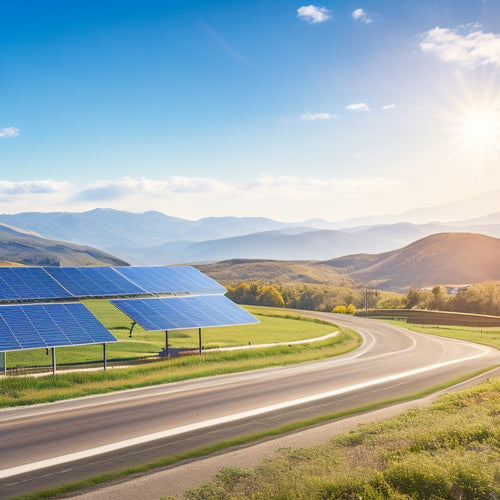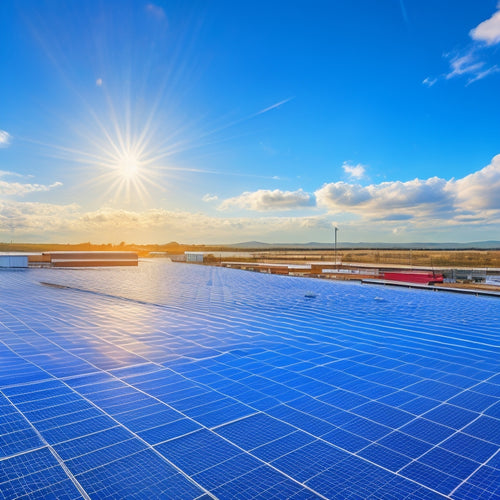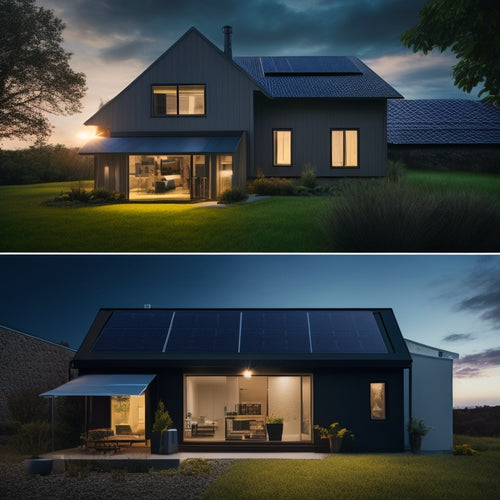
5 Ways to Solar-Power Your Home
Share
By solar-powering your home, you can achieve zero energy bills, increase your property value, and reduce your carbon footprint. You'll also benefit from grid-tie inverter benefits, which optimize energy production and allow for energy storage during outages. To maximize your system's performance, assess your daily energy usage to accurately size your solar power system. Additionally, guarantee a longer system lifespan by prioritizing expert installation techniques and regular maintenance. By understanding these key aspects, you'll be well on your way to unleashing the full potential of solar power for your home, and uncovering even more ways to utilize the power of the sun.
At a Glance
- Consider installing solar panels to reduce energy bills to nearly zero and increase property value by up to $15,000.
- Conduct an energy audit to identify areas of energy waste and improve energy efficiency through sustainable practices and home upgrades.
- Assess daily energy consumption to accurately size the solar power system and inform energy management strategies.
- Invest in a grid-tie inverter to optimize energy production, enable energy storage, and reduce costs during outages.
- Prioritize expert installation techniques and regular maintenance to ensure the solar power system lasts 25 years or more.
Zero Energy Bills
You're likely motivated to solar-power your home because you want to reduce your energy costs and lower your carbon footprint.
By installing a solar panel system, you can markedly decrease your reliance on the grid, slashing your energy bills to nearly zero. In fact, rooftop solar panels can increase your home's value and appeal, making it a more attractive selling point should you decide to move residential solar energy.
With a zero-energy bill, you'll not only save money but also contribute to a cleaner environment by reducing your greenhouse gas emissions.
Reducing Energy Costs
By utilizing the power of the sun, homeowners can greatly reduce their energy costs, virtually eliminating their reliance on traditional energy sources and slashing their utility bills to zero.
You'll be amazed at how much you can save by utilizing the sun's energy. To get started, conduct an energy audit to identify areas in your home where energy is being wasted. This will help you pinpoint opportunities to optimize your energy consumption.
By investing in renewable energy solutions, you can access your home's solar power potential and start generating clean energy. Additionally, with the rise of green buildings, it's now more important than ever to evaluate sustainable energy options.
Next, take advantage of utility incentives, such as net metering, which allows you to sell excess energy back to the grid and offset your energy costs. By installing solar panels, you can generate your own clean energy and reduce your reliance on the grid.
This not only saves you money but also provides you with a sense of independence and freedom from traditional energy sources. With solar power, you can enjoy the benefits of reduced energy costs and a cleaner, more sustainable lifestyle.
Lowering Carbon Footprint
Optimize your home's energy efficiency and take a significant step towards reducing your carbon footprint by leveraging solar power.
By incorporating sustainable materials and eco-friendly practices into your daily routine, you'll be well on your way to minimizing your environmental impact.
Consider investing in a home solar power battery solar energy storage solutions to store excess energy generated by your solar panels during the day, enabling you to power your home at night or during power outages without incurring additional costs.
Start by conducting an energy audit to identify areas of improvement, then invest in home insulation to reduce heat loss and energy consumption.
Consider purchasing carbon offsets to compensate for any remaining emissions.
Increased Property Value
When you install solar panels, you're not only reducing your energy bills, but you're also increasing your property's value.
In fact, according to experts, a residential solar installation can recoup up to 100% of its cost at resale. By doing so, you'll enhance its resale price, making it more attractive to potential buyers if you decide to sell in the future.
Additionally, your solar-powered home will become a long-term asset, appreciating in value over time as energy costs continue to rise.
Boosts Resale Price
Installing solar panels on your home can considerably increase its resale value, a benefit that's hard to ignore in today's competitive real estate market. Not only do solar panels enhance your home's aesthetics, but they also provide a significant selling point for potential buyers. According to the National Renewable Energy Laboratory, homes with solar panels sell for up to $15,000 more than similar homes without them.
Here's a breakdown of the benefits that contribute to increased resale value:
| Benefit | Description | Impact on Resale Value |
|---|---|---|
| Energy Independence | Reduce reliance on grid electricity | +$5,000 |
| Environmental Impact | Appeal to eco-conscious buyers | +$3,000 |
| Tax Incentives | Pass on tax benefits to new owners | +$2,000 |
| Financing Options | Attractive financing options for buyers | +$1,500 |
| Homeowner Satisfaction | Increased satisfaction leads to positive reviews | +$1,000 |
Long-Term Asset Value
The value of your property is a long-term asset that appreciates over time, and solar panels can greatly contribute to this growth.
As you consider solar-powering your home, it's crucial to understand how solar panels can increase your property's value. Not only do solar panels provide clean energy, but they also enhance your property's appeal to potential buyers.
According to the National Renewable Energy Laboratory, solar panels can increase your property's value by up to $15,000. This increased value isn't subject to property tax, allowing you to reap the benefits of your investment without additional taxation.
Furthermore, you can take advantage of solar incentives, such as the Solar Investment Tax Credit (ITC), which allows you to claim a tax credit of up to 26% of the total cost of your solar panel system.
Grid-Tie Inverter Benefits
When you install a grid-tie inverter in your solar-power system, you'll notice a significant increase in energy efficiency, as it optimizes energy production and minimizes losses.
With a solar power system that includes energy storage solutions, you can also reduce energy bills and guarantee power during outages. This, in turn, leads to reduced energy costs, since you'll be relying more on clean, renewable energy and less on the grid.
Increased Energy Efficiency
Your solar power system's grid-tie inverter plays an essential role in optimizing energy efficiency, allowing you to maximize your solar panel investment. By ensuring that your system operates at its peak performance, the inverter helps you reduce energy waste and makes the most of the renewable energy you're generating.
To further increase energy efficiency, consider conducting energy audits to identify areas in your home where energy is being wasted. Implement sustainable practices such as energy conservation and home upgrades, like installing smart technology and energy-efficient appliances.
You can also incorporate passive design elements, like large windows and insulation, to reduce your reliance on energy-intensive systems. Additionally, consider behavioral changes, like turning off lights and electronics when not in use, to reduce your overall energy consumption.
Reduced Energy Costs
One of the most considerable benefits of a grid-tie inverter is its ability to reduce your energy costs considerably. By utilizing renewable resources, you can generate electricity and feed any excess back into the grid, offsetting your energy consumption and lowering your utility bills.
You'll enjoy energy independence, relying less on the grid and more on your own sustainable living setup.
The financial benefits don't stop there. You can take advantage of solar incentives, such as tax credits, installation grants, and solar financing options, to offset the initial cost of your system.
With energy storage solutions, you can store excess energy for later use, further reducing your reliance on the grid. Community solar programs also offer opportunities to share the benefits of solar technology with your neighbors.
By investing in a grid-tie inverter, you're not only reducing your energy costs but also contributing to a cleaner, more sustainable future.
With the right system and incentives, you can break free from high energy bills and enjoy the freedom that comes with generating your own clean energy.
Assess Your Energy Usage
You'll need to determine your daily energy consumption to accurately size your solar power system.
To do this, you'll want to examine your energy usage patterns, including the time of day you use the most energy and which appliances consume the most power.
You may want to contemplate investing in residential solar energy storage systems to guarantee a reliable supply of clean energy.
Additionally, you can also investigate the benefits of photovoltaic panels(https://www.illchanterhislater.com) in utilizing solar energy.
Daily Energy Consumption
The household's energy profile is a critical component in determining the viability of a solar power system. To accurately assess your energy usage, you need to understand your daily energy consumption. This involves tracking your energy usage patterns, identifying areas of inefficiency, and pinpointing opportunities for improvement.
Conducting an energy audit is an excellent way to gather this information. An energy audit will help you identify which appliances and devices are consuming the most energy, and provide recommendations for reducing your energy consumption.
You can start by analyzing your past utility bills to determine your average daily energy consumption. This will give you a baseline to work from.
Then, make a list of all the appliances, lighting, and devices in your home, along with their wattage and usage hours. This will help you identify areas where you can cut back on energy consumption.
Energy Usage Patterns
Beyond your daily energy consumption, understanding your energy usage patterns is essential in optimizing your solar power system. You need to identify consumption trends, peak demand periods, and areas for behavioral changes to maximize the benefits of renewable sources.
Conducting energy audits helps you pinpoint inefficiencies and opportunities for usage optimization. By analyzing your energy usage patterns, you can identify the best times to integrate your solar power system, reducing your reliance on the grid and minimizing peak demand charges.
Monitoring tools enable you to track your energy usage in real-time, providing useful perspectives for load management and system integration.
Efficiency upgrades, such as smart appliances and energy-efficient lighting, can also considerably reduce your energy consumption. By understanding your energy usage patterns, you can make informed decisions about your solar power system, ensuring it's customized to your specific needs.
This leads to a more efficient, cost-effective, and environmentally friendly energy solution, giving you the freedom to control your energy usage and reduce your carbon footprint.
Longer System Lifespan
You'll want to guarantee your solar power system lasts for the long haul, and proper installation is key to achieving that goal.
A well-installed system can withstand various environmental conditions and operate at peak levels for 25 years or more.
Proper Installation Matters
A solar power system's lifespan directly correlates with its installation quality. When you decide to solar-power your home, it's vital to prioritize proper installation to guarantee your system operates efficiently and lasts longer.
You'll want to take into account professional services that employ expert installation techniques, adhering to safety protocols and local regulations. Avoid common mistakes made by DIY enthusiasts, such as incorrect system orientation or inadequate roof suitability assessments.
Invest in high-quality equipment and confirm it's properly secured to your roof. A well-installed system reduces the likelihood of maintenance issues down the line.
Regular maintenance tips, like cleaning your panels, will also help extend your system's lifespan.
Frequently Asked Questions
Can I Install Solar Panels on a Rented Property?
If you're renting, you'll need to review your renting agreements before installing solar panels; consider discussing solar panel options with your landlord, as some may be open to negotiating a mutually beneficial arrangement or finding alternative solutions.
Are Solar Panels Damaged by Hail or Extreme Weather?
Fierce freak storms won't frighten you; you're wondering if solar panels can withstand hail's harsh hit. Fortunately, most panels boast impressive hail resistance, and manufacturers test them to endure extreme weather conditions, ensuring your investment remains resilient and reliable.
Do Solar Panels Require Regular Maintenance Checks?
You'll want to inspect your solar panels regularly to confirm ideal performance, as neglecting maintenance can reduce their lifespan; aim for quarterly checks to maximize solar panel longevity, and consider professional maintenance every 6-12 months to assure peak efficiency.
Can I Use Solar Power for Electric Vehicle Charging?
You're not just driving on sunshine, you're utilizing it - literally! With solar charging, you can fuel your EV while enhancing EV efficiency, and break free from the grid, all while reducing your carbon footprint.
Are There Any Government Incentives for Solar Power Installation?
You'll be eligible for federal tax credits, covering up to 26% of your solar installation costs, and state rebates, varying by location, which can greatly reduce your upfront investment, giving you financial freedom to utilize the sun's energy.
Explore More
You've now got the keys to access a brighter, more energy-efficient future! By utilizing the power of the sun, you can drive your energy bills down to zero, increase your property value, and enjoy the benefits of a grid-tie inverter. Evaluating your energy usage and opting for a longer system lifespan will also pay off in the long run. Like a puzzle finally coming together, all these pieces will fit seamlessly to create a solar-powered home that's as efficient as it is eco-friendly.
Related Posts
-

Is Switching to Green Energy Solutions Easy
Switching to green energy solutions isn't just easy; it's also beneficial. You can greatly cut utility costs and enjo...
-

Commercial Solar Energy
As you consider powering your business with commercial solar energy, you'll uncover it offers a triple benefit: signi...
-

Cost of Home Solar Battery
You're looking to invest in a home solar battery to reduce your grid reliance, but you're curious about the cost. The...


